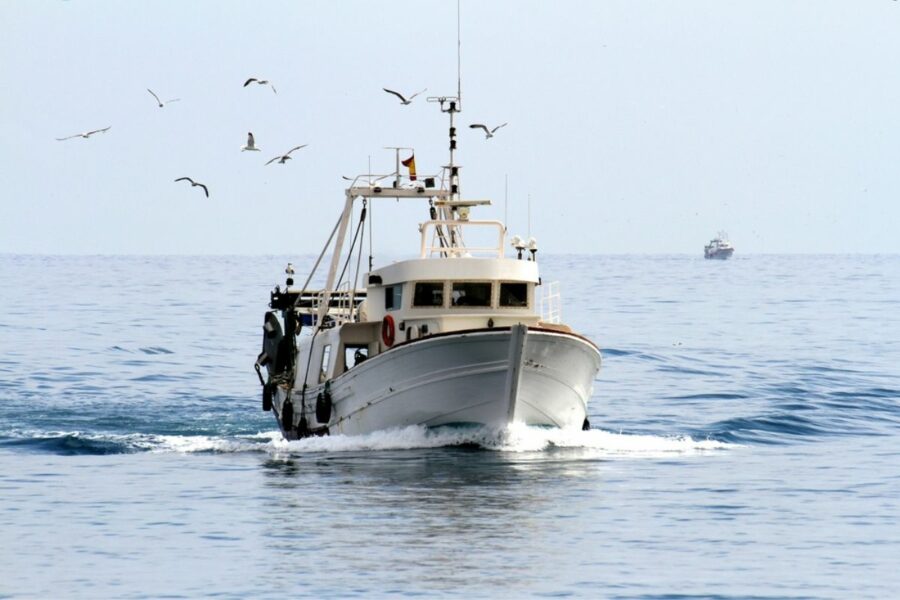Commenting after the presentation at Westminster last week of the joint NFFO/SFF spatial squeeze report, fishermen’s leaders told MPs that recognition and protection of fishing grounds could secure coastal employment, food security and the future of the fishing industry, without impacting on biodiversity targets or moves to expand offshore renewable energy, reports Andy Read.
Commissioned from consultants ABPmer by the NFFO and SFF, the report suggested that mobile-gear fishermen could lose access to up to 48% of the UK EEZ. “The fishing industry is not even a statutory consultee with respect to offshore wind,” NFFO CEO Barrie Deas told MPs. “We need to plan now, before many planning consents are formally awarded, to mitigate impacts and ensure that fishing and offshore power generation can co-exist.”
Thanking MPs attending for their obvious support and interest in the issue of spatial squeeze, Elspeth Macdonald added: “This report really shouldn’t have needed commissioning by industry. A comprehensive government planning process for offshore developments would have picked this up.
“The pace of change right now is the key worry, with fishing being ignored relative to the needs of biodiversity and renewable energy – both of which, in principle, the fishing industry supports.”
Addressing the room, Defra minister Mark Spencer welcomed the report, but made few firm commitments in relation to it. “This report comes at a crucial time. Government shares the federations’ ambitions for a diverse, sustainable and profitable industry. I recognise there are huge pressures on space in the marine environment, and working through these issues will be hard.”
He continued: “Defra will co-ordinate these concerns across other ministries, with scientists, in the discussions about MPAs. We need to look at where we can co-exist in the marine space.
“Fishing is not a statutory consultee. In some respects, with such a diverse industry, it is hard to see who the statutory consultee would be, but whatever the legal status, the fishing industry will always have a voice in these discussions.”
“I can assure you that I will maintain a robust conversation with my colleagues in other ministries and departments, and that we do need a balance between different stakeholders in the marine environment.”
SNP MP Philippa Whitford, confirming that it was essential that a balance be found between the needs of fishing, offshore energy and marine protection, asked what fishing activities could take place in wind farms and the research that had been carried out about the offshore developments that would least impact fishing.
South West MP Sheryll Murray expressed surprise that the industry was not a statutory consultee on wind power development – an issue she hoped the minister would seek to rectify. She echoed comments made about mitigation, and also asked whether previous dialogue with oil and gas developers was a model that wind power could follow.
Barrie Deas said: “Whilst it may be possible to switch to other types of fishing gear, there is always the risk of unintended consequences. Displacement by wind farms can push trawling into more sensitive habitats, for example, with much more negative impacts. Some MPAs have been designated for features that have nothing to do with fishing, but there appears to be a headlong rush to ban trawling in these areas, without any evidence of benefits from such a ban, simply to tick boxes.
“Oil and gas development took place more slowly, and this evolved into what was generally a constructive relationship, and eventually a model for co-operation. The pace we see now, and the message that has been sent to wind developers by government, means we are not seeing this level of co-operation develop.”
Elspeth Macdonald pointed to the large footprints of floating turbines, generally on softer ground favoured by trawling, and commented that the speed of developments meant research into the least intrusive types of turbines had simply not been undertaken.
Mike Park of the SWFPA added: “We haven’t even touched on the possible harm that wind farm cables can pose. Studies repeatedly suggest that electric currents, noise disturbance and pile driving can all have negative impacts on fisheries and the environment.
“The precautionary approach, however, regularly applied to fisheries, doesn’t appear to apply to offshore wind developments.”
This story was taken from the latest issue of Fishing News. For more up-to-date and in-depth reports on the UK and Irish commercial fishing sector, subscribe to Fishing News here or buy the latest single issue for just £3.30 here.








